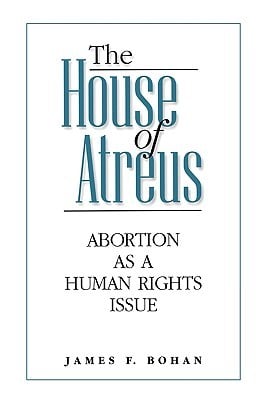James Bohan, a Pennsylvania attorney, believes he has elevated the abortion debate above the pedestrian levels of both medicine and religion. However, Mr. Bohan rises above faith and science only to fall back on the well-worn cliches of human rights doctrines found in the sacred texts of the Declaration of Independence, the writings of Albert Schweitzer, and the various declarations on human rights issued by international agencies. To finish off the argument with a literary veneer, he invokes “Aeschylus’s House of Atreus” as an historical-mythical model of a society addicted to irrational killing.
Along the way, the author manages to lose himself in the usual maze of illogic and bad history that has characterized both sides of the abortion debate. He cannot apparently conceive of an unborn child as a human being without according it full legal personhood. He must think that, in societies where women and children are not legal persons, it is open season on wives and minor sons. Because he cannot understand citizenship, apart from the theory of rights, he falls into the usual trap of equating Roe v. Wade with Dred Scott. Worst of all, he thinks that he can provide a non-religious ethical basis for respecting innocent life, when it is perfectly obvious that even the greatest pre-Christian civilizations allowed infanticide.
It is a familiar trap, which even explicitly Christian defenders of life fall into. Although they may have embraced the faith in their heart, their minds belong to the secular anti-Christian world of the Enlightenment. Intellectually, they are adherents to the religion of human rights: a religion without a particle of historical, natural, or logical foundation. It may be a stretch to ask people to worship the historical Jesus as “very God of very God,” but what can we say of people who venerate unexamined abstractions, like “All men are created equal”? It is better to carry a rabbit’s foot: Rabbits, at least, are real creatures, but no one has ever seen a right, much less eaten it or cut off its foot. Hares and rabbits are attested all over the world; rights are the peculiar manufacture of liberal intellectuals in modern Europe.
Bohan’s scholarship is on par with his theology. Even lawyers can be expected to know that Aeschylus did not write “The House of Atreus” but the Oresteia. If he had taken the trouble to read and digest Aeschylus’s masterpiece, he might have realized how wrongheaded he was, both about the ancient myth and about his muddleheaded defense of unborn life. It is very dangerous to equate the killing of Clytaemnestra—a woman who needed killing if anyone ever did—with the death of unborn children, and even Atreus—who killed Thyestes’ children and served them up to their father at a banquet—had a rational motive: revenge against a brother who had seduced his wife and tried to steal his throne. What comparable defense can be made by a woman who kills her own child, simply because it is inconvenient? But, then, who in his right mind would equate slavery with murder?
Why be so hard on the poor fellow? He meant well, after all, and worse books are published every month, not only on abortion but on marriage, religious freedom, and “family values.” That is the point. With very few exceptions, conservative and Christian books, however well intentioned their authors, are almost entirely without merit. Poorly written, badly argued, unresearched, they succeed only in convincing serious-minded people, both on the left and in the center, that the right has no case to make. Worst of all, in reformulating Christian arguments in the anti-Christian language of human rights, they continue to undermine the rational and historic basis of Christian thought and European civilization.
[The House of Atreus: Abortion as a Human Rights Issue by James F. Bohan (Westport, CT: Greenwood Press) 256 pp., $39.95]

Leave a Reply